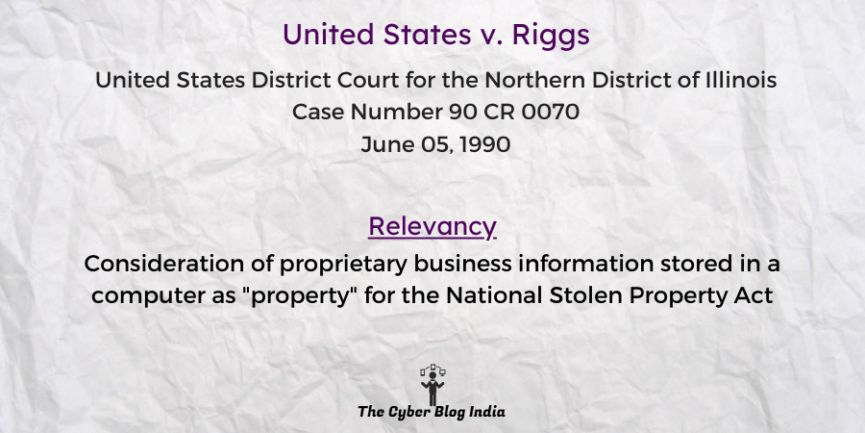United States v. Riggs

United States v. Riggs and Neidorf
739 F.Supp. 414
In the United States District Court for the Northern District of Illinois
Case Number 90 CR 0070
Before District Judge Bua
Decided on June 05, 1990
Relevancy of the Case: Consideration of proprietary business information stored in a computer as “property” for the National Stolen Property Act
Statutes and Provisions Involved
- The Wire Fraud Statute, 18 U.S.C. § 1343
- The National Stolen Property Act, 18 U.S.C. § 2314
- The Computer Fraud and Abuse Act, 18 U.S.C. § 1030
- The Federal Rules of Criminal Procedure (Rule 7(d))
- The Federal Rules of Evidence (Rule 801(d)(2)(E))
- The Jencks Act, 18 U.S.C. § 3500
Relevant Facts of the Case
- The defendants, Riggs and Neidorf, devised and began implementing a scheme to defraud Bell South, which provided telephone services. The objective was to steal its computer text file.
- Bell South considered this file to contain valuable proprietary information, as it had procedures for operating its 911 (E911) system for handling emergency calls.
- Riggs used his computer to gain unlawful access to Bell South’s computer system. He downloaded the text file and concealed his unauthorised access. He then transferred the file to Neidorf via an interstate computer data network.
- Neidorf then edited and retyped the file and published it in his newsletter.
- The government charged Riggs and Neidorf with wire fraud, interstate transfer of stolen property, and violation of the CFAA.
Prominent Arguments by Counsels
- The government’s counsel conceded that no court had held that the electronic transfer of confidential, proprietary information from across state lines constituted a violation of the NSPA. However, she argued that covering the defendants’ conduct under this law is a natural adaptation to modern society.
- The defendants’ counsel argued that the prosecution failed to allege a scheme to defraud, which is one of the necessary elements for a wire fraud claim. He received and transferred a computer text file and did not participate in any scheme to defraud. He further contended that their conduct did not fall within the scope of NSPA. They only transferred electronic impulses, which do not constitute goods, wares, or merchandise. He submitted that the thing a person is transferring must be eligible. He underlined that Congress specifically enacted the CFAA to address computer-related crimes. Hence, the government could not charge them under NSPA.
Opinion of the Bench
- The defendants prepared a fraud scheme and took actions to further their scheme. By using their computers, they transferred proprietary business information. When a person affixes proprietary information to a tangible medium, it constitutes goods, wares, or merchandise.
- Tangibility is not an absolute requirement for a thing to constitute goods, wares, or merchandise. Even if it is, computer-stored information is tangible.
- Congress did not intend the CFAA to be the only law governing computer-related crimes.
Final Decision
- The court denied the defendants’ pretrial motion, with exceptions.
Anjali Agrawal, an undergraduate student at the NALSAR University of Law, prepared this case summary during her internship with The Cyber Blog India in May/June 2022.
